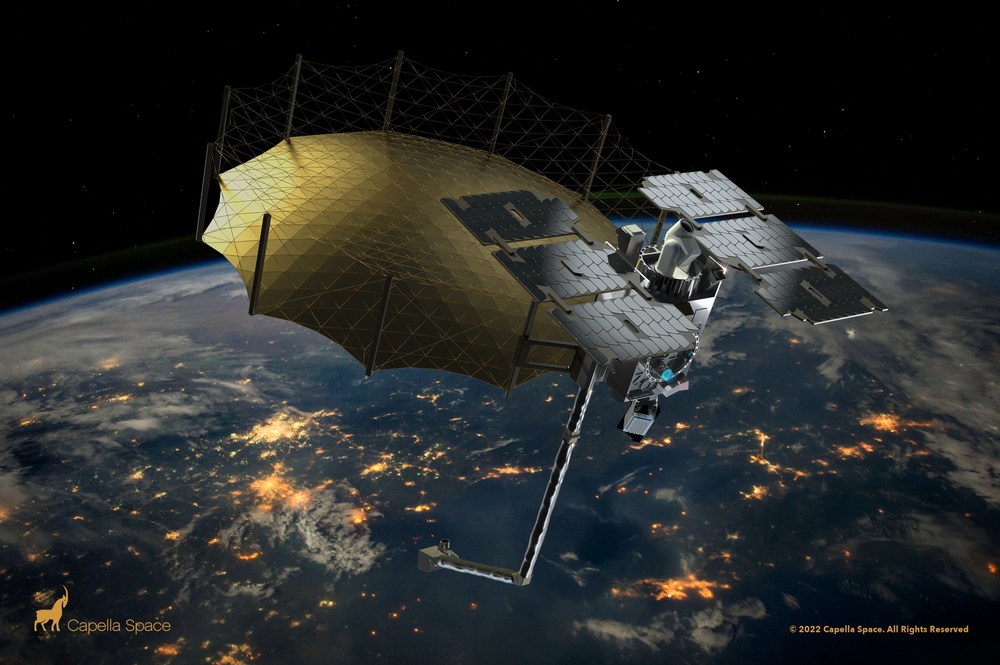Capella Space, an Earth observation company, unveiled several new capabilities planned for its next generation satellites, that further expands the company’s latest, data offerings. This new generation of Capella satellites, referred to as “Acadia” technology, will expand the existing Capella constellation to provide highest quality imagery, best ground-range resolution, and the fastest order-to-delivery speeds available from any commercial SAR provider.
Capella’s Acadia generation of satellites will unlock improved, cutting-edge technology to further advance Capella’s industry-leading Earth-imaging offerings, including:
- Best resolution with increased bandwidth: By increasing radar bandwidth from 500 MHz to 700 MHz, Capella customers will enjoy refined, industry-leading resolution, with Slant Range Resolution improving down to 0.214 m and Ground Range Resolution to 0.31 m for standard look angles.
- Highest quality imagery with increased power: Capella customers are already accustomed to Capella’s high quality SAR imagery. With this next generation of satellites, the company is further increasing image quality by scaling power by more than 40%, in line with increased bandwidth. The combination of increased bandwidth and increased power further strengthens Capella’s already premium SAR products. This ensures customers can see even more detail in Capella’s imagery and more accurately detect an even broader range of objects.
- Fastest order-to-delivery with improved payload downlink: Capella has already pioneered the usage of GEO communication satellites for near real-time tasking of its satellites. In this next generation of satellites, upgrades to the payload downlink antenna will reduce time between ground contact and imaging opportunities, improving delivery speed and enabling customers to access even more imaging capacity, directly from their own ground stations.
- Reduced latency with inter-satellite communications: The Acadia spacecraft will be equipped with optical communications terminals (OCTs). Capella is the first commercial SAR company to demonstrate Optical Inter-Satellite Links (OISL), compatible with the U.S. Space Development Agency (SDA)’s new National Defense Space Architecture (NDSA) and standards. High-speed links will enable Capella to drastically reduce latency from collect to downlink for critical decision-making on the ground.

“Capella’s Acadia satellite technology is the result of our team’s drive to push the limits of SAR and our commitment to technology innovation,” said Payam Banazadeh, CEO and founder of Capella Space. “Since our first satellite launch, we’ve been paving the way to offer SAR data that is timely, reliable, accessible, and of industry-leading quality. Our new Acadia class of satellites will deliver even higher resolution and quality which will equip our customers worldwide with the tools and information they need to take problem-solving to the next level.”
The Capella Space constellation currently provides industry-leading satellite capabilities, including a 10-minute payload duty cycle, which results in five times the imaging capacity per satellite than the leading competitor, and sufficient orbital diversity to allow customers to collect images more frequently, regardless of weather conditions. Capella is the first Earth-observation company to enable the Inter-Satellite Data Relay System (IDRS), which allows customers to task a spacecraft in under 15 minutes for emergency or tip and cue operations. Additionally, Capella operates a fully-automated scheduling, downlink, and processing architecture and provides access through a self-service, user-driven tasking console.
The first of the Capella Acadia satellites is slated to launch in early 2023.

